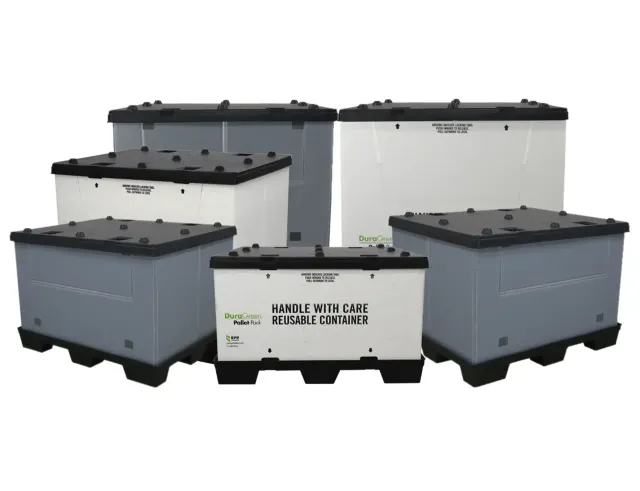The Function of Mass Plastic Containers in Effective Recycling Practices and Sustainability
Mass plastic containers are integral to modern reusing efforts. Their style improves the performance of product collection and transportation, adding to sustainability goals. These containers not only enhance space yet likewise aid in keeping an eye on contamination degrees. Nevertheless, their execution is not without difficulties. Understanding the full extent of their impact exposes an intricate partnership in between logistics and environmental obligation that requires further expedition.
Recognizing Mass Plastic Containers
Mass plastic containers serve as a necessary component in different sectors, assisting in the storage space and transportation of items. These containers are commonly made from durable products such as high-density polyethylene (HDPE) or polypropylene, which provide resilience and resistance to ecological elements. Their design usually consists of attributes like stackability and modularity, enabling reliable usage of area throughout both storage space and transit.
Industries such as farming, food handling, and producing regularly utilize mass plastic containers as a result of their light-weight nature and convenience of handling. The containers come in different sizes and configurations, satisfying the certain demands of different items. Their flexibility extends beyond plain performance; they can additionally be personalized with covers, deals with, and identifying alternatives to improve functionality - Bulk Plastic Containers. Therefore, bulk plastic containers play an essential function in enhancing logistics and supply chain procedures throughout several industries, consequently adding to general effectiveness and cost-effectiveness
Advantages of Utilizing Mass Plastic Containers in Recycling
The application of bulk plastic containers considerably enhances the effectiveness of the procedure when companies prioritize recycling efforts. These containers are created to maximize room, enabling the storage space and transport of bigger quantities of recyclable products. This causes less trips to recycling centers, consequently decreasing fuel intake and connected emissions.
Additionally, bulk plastic containers are immune and durable to numerous environmental aspects, making sure that products continue to be shielded throughout handling and transit. Their light-weight style better adds to lower transport expenses.
Furthermore, the uniformity of these containers helps with far better sorting and handling of recyclable products, which can enhance overall recycling prices - plastic bulk containers. Organizations that embrace bulk plastic containers also demonstrate a dedication to sustainability, favorably influencing their brand name image. Inevitably, these benefits not just improve recycling techniques but additionally add to broader environmental objectives
Just How Mass Plastic Containers Facilitate Material Collection
Effective product collection is significantly enhanced by the use bulk plastic containers, as they provide a organized and reliable remedy for collecting recyclable items. These containers are made to accommodate big volumes of materials, which streamlines the sorting and storage space process. Their stackable design maximizes room use, making it easier for centers to organize recyclables without mess.
In addition, mass plastic containers are resilient and weather-resistant, enabling for exterior positioning without destruction. This durability ensures that products stay safeguarded until they are collected for processing.

The uniformity in size and shape of these containers facilitates standardization across collection factors, enabling better monitoring of recyclable volumes. Their transparent nature enables for easy visibility of components, aiding in the monitoring of contamination levels and ensuring that only ideal materials are accumulated. Overall, bulk plastic containers play a crucial function in simplifying the product collection process, thus advertising efficient recycling methods.
Transportation Performance and Environmental Effect
Transportation performance plays an important role in the recycling process, specifically with the optimization of tons capacity wholesale plastic containers. By making the most of the volume of product moved, firms can considerably lower the variety of journeys required, therefore lessening their carbon impact. This technique not just boosts functional efficiency yet also adds to much more sustainable ecological practices.

Maximizing Lots Ability
Although enhancing load capability is usually neglected, it plays a necessary duty in improving transportation performance and decreasing ecological influence in reusing practices. By making the most of the volume that mass plastic containers can hold, reusing procedures can minimize the variety of journeys needed for transportation. This not just decreases fuel intake however also reduces the wear and tear on lorries. Effective lots management allows centers to make use of area successfully, making certain that each transport cycle is as effective as feasible. Furthermore, well-optimized tons can result in better settlements with logistics providers, potentially reducing overall expenses. Eventually, improving lots capability adds to a more sustainable recycling system by fostering reliable resource usage and lessening waste produced throughout transport.
Minimizing Carbon Impact
As reusing procedures venture to lessen their ecological influence, reducing the carbon impact related to transportation arises as a vital goal. Bulk plastic containers play an important function in attaining this purpose by enhancing tons effectiveness and enhancing logistics. Their lightweight yet durable design permits maximum freight space utilization, lowering the variety of trips required to carry products. By settling deliveries, recycling facilities can reduce fuel consumption and greenhouse gas emissions. In addition, tactically finding recycling facilities minimizes transport ranges, in addition lowering carbon outputs. Additionally, using fuel-efficient cars and alternative power sources boosts overall sustainability. By integrating these methods, the recycling industry can appreciably diminish its carbon impact, adding to an extra lasting future.
Obstacles in using Mass Plastic Containers

Contamination Problems
Contamination concerns stand for a substantial difficulty in the reliable usage of bulk plastic containers within recycling techniques. These containers frequently accumulate deposits from previous contents, bring about mixed materials that can impede the reusing procedure. Pollutants such as food waste, chemicals, or non-recyclable products can endanger the stability of the whole set, resulting in increased disposal costs and decreased recycling prices. Additionally, improper cleansing or sorting can worsen these concerns, making it challenging for reusing centers to refine products effectively. The visibility of impurities not just influences the quality of recycled items however likewise weakens the overall sustainability initiatives targeted at decreasing plastic waste. Attending to these contamination obstacles is vital for boosting the efficiency of mass plastic container recycling.
Recycling Facilities Limitations
Ineffectiveness in recycling infrastructure poses substantial challenges for the efficient monitoring of bulk plastic containers. Several reusing centers do not have the ability to refine large volumes of these containers efficiently, leading to enhanced hold-ups and expenses. Inadequate sorting modern technologies usually lead to contamination, as mass containers might be blended with other materials, making complex the recycling procedure. Restricted transport options also impede the activity of bulk plastic containers to proper reusing facilities, resulting in increased land fill waste. Furthermore, a lack of standard procedures for mass container recycling develops confusion amongst customers and companies, additionally complicating initiatives to promote sustainability. Resolving these facilities constraints is important to improve reusing practices and make best use of the capacity of mass plastic containers in a circular economic situation.
Finest Practices for Implementing Bulk Plastic Containers
When organizations take into consideration i thought about this applying bulk plastic containers in their recycling methods, they must focus on a strategic technique that enhances efficiency and lowers contamination threats. Selecting the ideal container size and kind is essential to suit the volume of products being refined. Organizations must also establish clear labeling and signs to guide customers on proper disposal approaches, minimizing confusion and mistakes. Normal training sessions for staff can further strengthen these techniques, making sure everybody understands their roles in maintaining recycling integrity.
In addition, organizations ought to apply a regular upkeep routine to evaluate and clean containers, avoiding the build-up of contaminants. Partnering with regional recycling facilities can additionally simplify the collection process, guaranteeing that materials are properly refined. Lastly, organizations ought to monitor and evaluate their recycling metrics, using this data to fine-tune practices in time and promote continual renovation in their sustainability initiatives.
The Future of Mass Plastic Containers in Lasting Practices
As companies increasingly focus on sustainability, the duty of bulk plastic containers in recycling techniques is readied to develop significantly. Innovations in materials scientific research are bring about the advancement of eco-friendly and recyclable alternatives, boosting the ecological advantages of bulk plastic containers. Additionally, the implementation of closed-loop systems will certainly permit less complicated collection and repurposing of these containers, decreasing waste and source usage.
Technical innovations, such as wise radar, will certainly allow firms to monitor the lifecycle of mass containers, enhancing performance in reusing processes. As consumer demand for lasting practices expands, services will likely adopt mass plastic containers developed for reuse and long-term value. In addition, cooperation between governments and sectors will cultivate the establishment of standardized recycling procedures, making certain that mass containers are properly incorporated into wider sustainability initiatives. On the whole, the future of mass plastic containers shows up promising, with considerable capacity for contributing to a round economic situation.
Regularly Asked Concerns
Just How Are Mass Plastic Containers Made and What Materials Are Utilized?
Bulk plastic containers are generally made from high-density polyethylene (HDPE) or polypropylene (PP) These materials are processed with injection molding or strike molding techniques, leading to durable, light-weight containers appropriate for various storage space and transportation requirements.
Can Bulk Plastic Containers Be Reused Numerous Times Prior To Recycling?
Yes, bulk plastic containers can be reused numerous times prior to recycling. Their toughness and design enable duplicated use in various applications, advertising sustainability and source effectiveness while decreasing the need for brand-new containers.

What Certifications Exist for Mass Plastic Containers in Recycling?
Numerous accreditations for mass plastic containers include the Recycling Partnership's qualification, the Cradle to Cradle Qualified ™ standard, and the Lasting Product packaging Coalition's standards, guaranteeing containers satisfy details ecological and recyclability criteria for effective recycling.
How Do Bulk Plastic Containers Contrast to Various Other Recycling Storage Options?
Mass plastic containers provide greater longevity and ability compared to various other reusing storage space alternatives, decreasing the risk of contamination and facilitating efficient transport. Their style sustains far better organization, enhancing overall effectiveness in recycling operations.
What Is the Life-span of a Mass Plastic Container in Recycling Processes?
The life-span of a bulk plastic container in recycling procedures normally varies from 5 to ten years, depending on usage, worldly high quality, and ecological problems, permitting multiple cycles of usage before ultimate disposal or recycling.
When organizations focus on recycling efforts, the usage of mass plastic containers considerably enhances the performance of the process. Transport performance plays an essential function in the reusing procedure, especially through the optimization of load capability in mass plastic containers. The usage of bulk plastic containers in recycling practices faces substantial difficulties, specifically worrying contamination concerns and limitations within recycling facilities. Contamination problems represent a considerable difficulty in the efficient use of bulk plastic containers within reusing practices. When organizations think about carrying out mass plastic containers in their reusing More Help techniques, they need to prioritize a tactical method that boosts efficiency and minimizes contamination dangers.